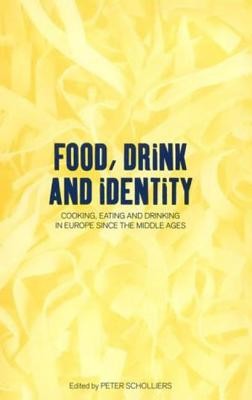
- We will send in 10–14 business days.
- Publisher: Berg 3pl
- Year: 2001
- Pages: 256
- ISBN-10: 1859734618
- ISBN-13: 9781859734612
- Format: 15.6 x 23.4 x 1.3 cm, minkšti viršeliai
- Language: English
- SAVE -10% with code: EXTRA
Food, Drink and Identity (e-book) (used book) | bookbook.eu
Reviews
Description
Food and drink have provided fascinating insights into cultural patterns in consumer societies. There is an intimate relationship between food and identity but processes of identity formation through food are far from clear. This book adds a new perspective to the existing body of scholarship by addressing pivotal questions: is food central or marginal to identity construction? Does food equally matter for all group(ing)s? Why would, in peoples experience, food become especially important at one moment, or, on the contrary, lose its significance? The origin of food habits is also interrogated. Contributors investigate how, when, why and by whom cooking, eating and drinking were used as a means of distinction. Leading historians and sociologists look at concepts of authenticity, adjustment, invention and import, as well as food signs and codes, and why they have been accepted or rejected. They examine a wide range of periods and topics: the elderly, alcohol and identity in Early Modern Europe; food riots and national identity; noble families, eating and drinking in eighteenth-century Spain; consumption and the working class in the nineteenth century; commensality; the meaning of Champagne in Belle-Epoque France; the narrative of food in Norway; wine and bread in French Algeria; food and identity in post-war Germany. This intriguing book brings together new, comparative insights and research that allow a better understanding of processes of integration and segregation, the role of food in the construction of identity, and the relationship between old and new food habits.
EXTRA 10 % discount with code: EXTRA
The promotion ends in 21d.15:19:54
The discount code is valid when purchasing from 10 €. Discounts do not stack.
- Publisher: Berg 3pl
- Year: 2001
- Pages: 256
- ISBN-10: 1859734618
- ISBN-13: 9781859734612
- Format: 15.6 x 23.4 x 1.3 cm, minkšti viršeliai
- Language: English English
Food and drink have provided fascinating insights into cultural patterns in consumer societies. There is an intimate relationship between food and identity but processes of identity formation through food are far from clear. This book adds a new perspective to the existing body of scholarship by addressing pivotal questions: is food central or marginal to identity construction? Does food equally matter for all group(ing)s? Why would, in peoples experience, food become especially important at one moment, or, on the contrary, lose its significance? The origin of food habits is also interrogated. Contributors investigate how, when, why and by whom cooking, eating and drinking were used as a means of distinction. Leading historians and sociologists look at concepts of authenticity, adjustment, invention and import, as well as food signs and codes, and why they have been accepted or rejected. They examine a wide range of periods and topics: the elderly, alcohol and identity in Early Modern Europe; food riots and national identity; noble families, eating and drinking in eighteenth-century Spain; consumption and the working class in the nineteenth century; commensality; the meaning of Champagne in Belle-Epoque France; the narrative of food in Norway; wine and bread in French Algeria; food and identity in post-war Germany. This intriguing book brings together new, comparative insights and research that allow a better understanding of processes of integration and segregation, the role of food in the construction of identity, and the relationship between old and new food habits.


Reviews